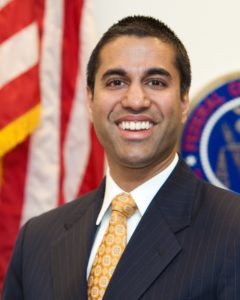A blow to the open Internet: net neutrality repealed in the United States
The regulatory agency FCC voted to drop the previous rules despite massive protests. Critics now fear that a two-class Internet will arise. Politicians and business executives continue to oppose the decision.
The opposition was apparently to no avail. The Federal Communications Commission (FCC) drew on its Republican majority last week and voted 3:2 to repeal rules introduced by the Obama administration in 2015 that were designed to ensure net neutrality. As a result, net neutrality is virtually a thing of the past in the United States. In the future, Internet service providers (ISPs) in the United States will be able to direct traffic on the Web, providing preferential treatment to paying customers while blocking or impeding others.
This is exactly what the previous rules were designed to prevent, of which the guiding principle was to serve as a means of encouraging net neutrality. However, this does not eliminate the option of other alternatives, albeit subject to charges, that could transmit particular data packages even faster. Moreover, network service providers should also not artificially slow or block other data packages – such as those from competitors.
Before the decision was made last week, Internet service providers such as AT&T, Comcast and Verizon applied pressure on the FCC, demanding that the regulatory agency should bury the net neutrality rules. They argued that the regulations would stifle innovation and hinder investment in net expansion. They can now hope to cash in on new premium business models. Those who are willing to pay will be rewarded with faster transmission of their data packages. In addition, ISPs will no longer be classified as common carriers that are subject to stricter regulatory requirements – in such areas as online data protection. As a result, they may sell data on all online activities of their customers to the highest bidder without their customers’ permission.
Protests go unheard, but continue
The decision to abolish net neutrality in the United States was preceded by waves of protest around the world. An Internet-wide day of action was held on July 12 in an attempt to save net neutrality and preserve an open Internet. Cliqz added its voice to the effort, too. In e-mails and comments to the FCC, millions of Internet users expressed their anger about plans to overturn the previous net neutrality rules. However, all objections were ignored by the Republican members of the FCC, including Chairman Ajit Pai, who was nominated by Donald Trump.

Nevertheless, opposition still continues. Just a few hours after the FCC’s vote was announced, a number of U.S. states (including Washington and New York) announced that they intend to fight the decision in court. As a final possible step, California and Washington said they would introduce their own net-neutrality rules, a move that could prove to be legally challenging.
A number of Internet companies and consumer-protection groups will certainly file their own suits aimed at thwarting the FCC’s decision. The Internet Association that represents the interests of such Internet giants as Google, Facebook or Netflix says it is also weighing legal options. The association wants to maintain the old rules because the new regulations will create “a worse Internet for consumers” and “less innovation online.” Consumer-protection advocates fear that Internet service providers will exploit their position as gatekeepers to the Internet and could control the type of and price for content consumers would see.
Long-term impact on Europe is difficult to predict
It is hard to say what sort of long-range effect the end of net neutrality in the United States will have on Europe. Net neutrality in Europe has indeed been regulated by an EU directive since fall 2015. Over the long term, however, actions in the United States could also influence European regulatory practices.
The EU directive still states that data-traffic rules should not be based on “on commercial considerations.” It also bans techniques “to monitor specific content.” But interventions during periods of congestion on the Internet are permitted. Human-rights organizations and Internet companies have repeatedly argued that the directive is too vaguely worded and that it has back doors that can be used to maneuver around the rules. For this reason, the Body of European Regulators for Electronic Communications (BEREC) released net-neutrality guidelines that clarify the EU directive at the end of August 2016.
Cliqz Managing Director Marc Al-Hames views net neutrality as the foundation of the open Internet that Cliqz fights for: “Anything else would destroy the Web as we know it.”




